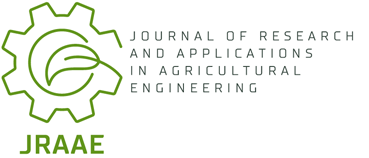Current issue
Online First
Archive
Instructions for Authors
Guide for Authors
Peer Review Policy
Research Ethics Policy
Crossmark Policy
Ghostwriting and Guest Authorship
Copyright
Open Access Policy
Plagiarism
About the Journal
Aim and Scope
Scientific Board
Publisher
Editorial Board
Indexing in Databases
Personal Data Protection
Repository Policy
Contact
ORIGINAL PAPER
Ecological farming and agritourism - the attempt of depiction mutual dependences
Journal of Research and Applications in Agricultural Engineering 2006;51(2):224-229
KEYWORDS
ABSTRACT
The ecological agriculture is an element of sustainable development. From year to year it gains on the importance. The similar tendency is identified in the case of tourism. The common practice of many farms is offering of agritourism services. While there are present in their surroundings some worth nature resources, this activity is called as ecoagritourism. It is a product of combining between the rural tourism (ecotourism and agritourism) and ecological agriculture. This ecoagritourism is a new paradigm, so because of this it is some need to analyse it's background in the aspect of interactions. This analysis is based on the innovative conception of ecoagritourim triangle, which make easy to define some possibilities, benefits an needs to support this system. The presented approach is some reason to create vision of ecoagritourism communities which are supported by the clusters conception. This viewpoint allow to identify possible directions of changes at the case of different encouraginf instrument from side of the state. The best instrument of coordination at ecoagritourism planning is Project of Tourism Development Strategy for 2007-2013.
REFERENCES (27)
1.
Brodzicki T., Szultka S., Tamowicz P., Polityka wspierania klastrów, najlepsze praktyki, rekomendacje dla Polski, Instytut Badań nad Gospodarką Rynkową, Gdańsk 2004., s. 36.
2.
Clarke J., Farm accommodation and the communication mix. Tourism Management, 17(8), 611-620.
3.
Coleman D., Tourism: meeting the challenge - 17 & 18 September 2001 - Riviera Centre, Torquay, dokument online (http://www.lga.gov.uk/content....) z dnia 2006-04-26.
4.
Department of the Environment, Transport and the Regions, Our Countryside: the future, A fair deal for rural England, Crown Copyright, London 2000, s. 84.
6.
Fleischer A., Tchetchik A., Doas rural tourism benefit from agriculture?, Tourism Management, 29 (2005) 493-501.
7.
Halfacree K., locality and social representation: space, discourse and alternative definitions of the rural. Journal of Rural Studies, 9 (1): 23-37, 1993.
8.
López E.P., Garcia F. J. C., Agrotourism, sustainable tourism and Ultraperipheral areas: the Case of Canary Islands, PASOS, Revista de Turismo y Patrimonio Cultural, Vol. 4, No. l, pp. 85-97, 2006.
9.
Łobożewicz T., Bieńczyk G., Podstawy turystyki, Wyższa Szkoła Ekonomiczna, Warszawa 2001.
11.
Mikuta B., Żelazna K., Organizacja ruchu turystycznego na wsi, Wydawnictwo Format-AB, Warszawa 2004.
12.
Ministerstwo Gospodarki i Pracy, Projekt Strategii Rozwoju Turystyki na lata 2007-2013, Warszawa, czerwiec 2005, s. 6.
13.
Ministerstwo Rolnictwa i Rozwoju Wsi, Strategia rozwoju obszarów wiejskich i rolnictwa na lata 2007-2013, Warszawa, czerwiec 2005, s. 53.
14.
Nilsson P.A., Staying on farms-an ideological back-ground. Annals of Tourism Research, 29(1), 7-24.
15.
Obidzińska E., Zdrowa żywność i produkty regionalne - hitem targów Grune Woche. Jak zarobić na ekologicznej modzie?, Agroserwis, nr 3(330), 2006, s. 32-33.
16.
Szultko S. (red.), Klastry, Innowacyjne wyzwanie dla Polski, Instytut Badań nad Gospodarką Rynkową, Gdańsk 2004, s. 7.
17.
Szymona J., Rola jednostek certyfikujących w systemie kontroli w rolnictwie ekologicznym, materiały z seminarium pt.: Rolnictwo ekologiczne - nowe warunki działania wynikające z członkostwa Polski w Unii Europejskiej, Warszawa, 28 czerwca 2004, s. 16-18.
18.
Szymoniuk B., Podwyższanie konkurencyjności regionu rolniczego: klaster "Dolina Ekologicznej żywności", [w:] Olesiński Z., Predygier A. [red.], "Kreowanie konkurencyjności regionu. Grona przemysłowe w regionie", Wydział Zarządzania i Administracji Akademii Świętokrzyskiej, Kielce 2005.
19.
Świetlikowa K., Kazimierczak R., Ocena aktualnego stanu przygotowania do świadczenia usług agroturystycznych wybranej zagrody wiejskiej w gminie Biała Piska, [w:] Zbytek Z. (red.), Wybrane zagadnienia ekologiczne we współczesnym rolnictwie, Monografia, T. 2, Cz. 1. Wybrane zagadnienia rolnictwa ekologicznego w Polsce, Przemysłowy Instytut Maszyn Rolniczych, Poznań 2005, s. 366-375.
20.
Torres R., Linkages between tourism and agriculture in Mexico, Annals of Tourism, Vol. 30, No. 3, pp 546-566, 2006.
21.
United Nations World Tourism Organisation , World Tourism Barometer, Vol. 4, No. l, January 2006.
22.
Veer M., Tuunter E., Rural tourism in Europe. An exploration of success and failure factors, Stichting Recreatie, Expert and Innovation Centre, Hague 2005.
23.
World Tourism Organisation Seminar on Rural Tourism "Guidelines for Development" Yeremcha, Ukraine, 25th and 26th September 2003, Conclusions, s. 5.
24.
Woźniak L., Dolina ekologicznej żywności - szanse i perspektywa dla Podkarpacia, Lublin 2006, (w druku).
25.
Woźniak L., Kuśnierz M., Woźniak M., Herbert J., The Importance of Ecotourism in the Development of Communities, with Special Regard to Poland, [w:] Cynarski W. J. (red.), Obodyński K. (red.), Tourism and Recreation in the process of European Integration, University of Rzeszów, Podkarpackie Society of Physical Culture Science in Rzeszów, Rzeszów 2004, s. 56-64.
26.
Woźniak M., Turystyka wiejska i jej powiązania z rolnictwem, ekologią i etyką, Roczniki Naukowe Stowarzyszenia Ekonomistów Rolnictwa i Agrobiznesu, T.III, Z. 6, Warszawa-Poznań-Białystok 2001, s. 21-24.
27.
Zaręba D., Ekoturystyka. Wyzwania i nadzieje, Wydawnictwo Naukowe PWN, Warszawa 2000.
Share
RELATED ARTICLE
We process personal data collected when visiting the website. The function of obtaining information about users and their behavior is carried out by voluntarily entered information in forms and saving cookies in end devices. Data, including cookies, are used to provide services, improve the user experience and to analyze the traffic in accordance with the Privacy policy. Data are also collected and processed by Google Analytics tool (more).
You can change cookies settings in your browser. Restricted use of cookies in the browser configuration may affect some functionalities of the website.
You can change cookies settings in your browser. Restricted use of cookies in the browser configuration may affect some functionalities of the website.


